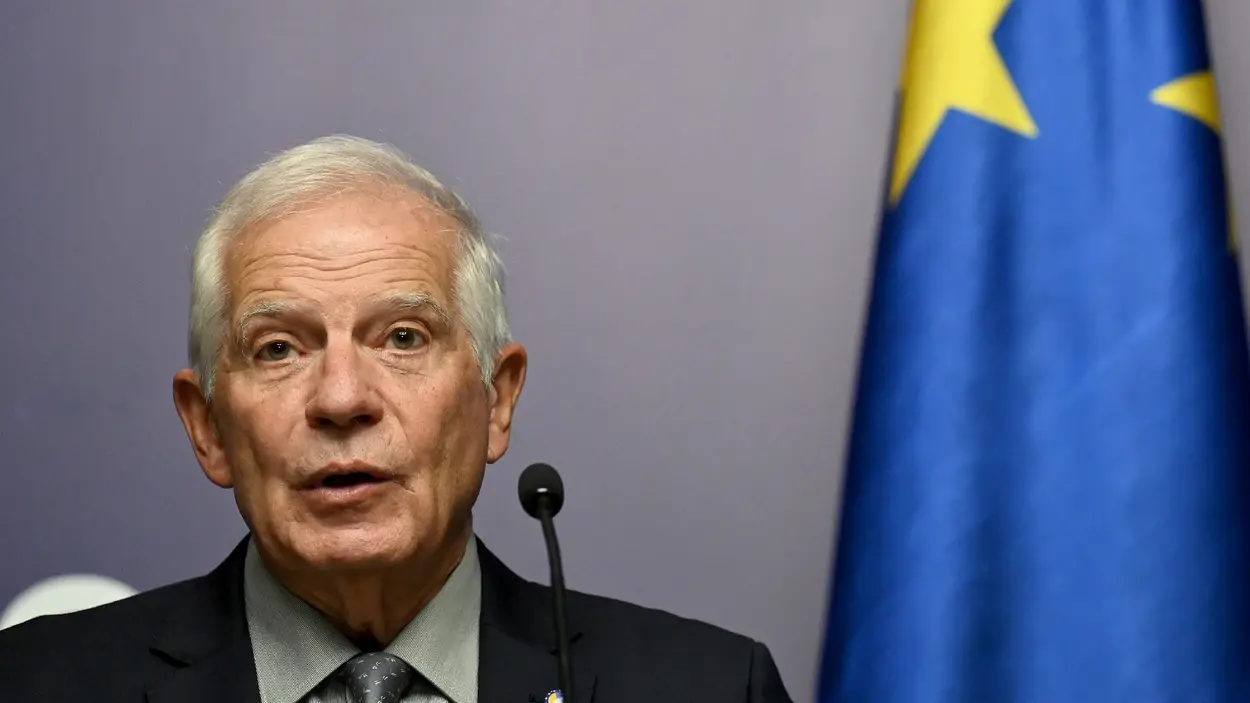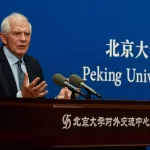EU-China “mutual trust” has been “undermined” according to the head of European diplomacy Josep Borrell. He also pointed out the “difficulties” for foreign companies in accessing the Chinese market on Friday in Beijing.
The Spaniard arrived in China on Thursday to defend the European “risk reduction” strategy with Beijing, its main trading partner, as well as lay the foundations for a bilateral summit this year.
“Trust is at the heart of every human relationship and (…) mutual trust has been undermined,” Josep Borrell said in a speech at the prestigious Peking University.
“We must work to restore this trust. It will not come back by miracle,” he added.
He stressed that the trade imbalance between the European Union (EU) and China, which is 400 billion euros, “is not only quantitative, but also qualitative.”
“It affects sectors in which we have a comparative advantage… We believe that the problem is not due to a simple difference in productivity,” he said.
“In my opinion, in our opinion, the cause is the result of the persistent difficulties faced by European companies when they want to access the Chinese market,” he said.
Josep Borrell’s visit, postponed twice this year, is scheduled to last until Saturday and will address topics such as bilateral relations, international issues and trade.
It began Thursday in Shanghai with an “exciting exchange” with European companies “on economic and commercial challenges,” Mr. Borrell said on the social network X (formerly Twitter).
He is due to meet Chinese Foreign Minister Wang Yi on Friday.
Ukraine and Israel
According to the European Union, this visit by its High Representative for Foreign Affairs, the latest in a series of high-level dialogues with Beijing, “should lead to an EU-China summit later this year.”
Sino-European relations have been strained since Russia’s invasion of Ukraine in February 2022 because Beijing, which calls for respect for the territorial integrity of all states, including Ukraine, has not condemned Moscow.
Brussels is trying to reconcile its desire to be less dependent on the Asian giant, particularly economically, while maintaining solid ties with the world’s second largest economy.
“China welcomes the visit of High Representative Borrell” which “will give new impetus to the joint efforts of the two sides to address global challenges and maintain peace and stability in the world,” welcomed Wednesday Wang Wenbin, a foreign minister. – spokesperson for the Chinese Ministry of Foreign Affairs.
Josep Borrell’s visit comes days after the outbreak of the Israel-Hamas war, over which he called an emergency meeting of European foreign ministers.
On this issue, Beijing called on all parties to “cease fire”.
At a joint press conference with Wang Wenbin, Josep Borrell said both sides “agree that the only stable solution is the two-state solution”, and reaffirmed their “condemnation of Hamas attacks” .
Wang Wenbin, however, attributed the root cause of the conflict to “historical injustice” against the Palestinians.
“The root of this problem lies in the long delay in realizing Palestine’s aspiration to create an independent state and the failure to correct the historical injustice suffered by the Palestinian people,” he said. he declared.
He also asserted that Israel and Palestine both had “the right to have a state”, but was “concerned” about “the survival of the Palestinians”.
“But who will care about the survival of the Palestinians? The Israeli nation is no longer displaced in the world. When will the Palestinian nation be able to return to its country of origin?” he asked.
Considerable effort
Josep Borrell’s stay should also be an opportunity to address the Ukrainian issue.
The position of Beijing, which presents itself as a neutral party, was criticized by the EU and Josep Borrell again judged it on Friday “difficult to understand”.
“We are not asking China to adopt the same point of view as the European Union” on the war, he stressed.
“But we consider it essential that China makes a considerable effort to convince the Ukrainian people that it is not Russia’s ally in this war.”
European Commission President Ursula von der Leyen said the EU wanted “risk reduction” with China but not “decoupling” – the latter term refers to a deeper break in relations.
China denounced the initiative, seeing it as “pure protectionism”.
The Asian giant has been banking on electric engines for a long time and has taken a step ahead of Europe in this area.
At the beginning of October, the EU also unveiled a list of strategic areas which must be better defended against states considered rivals such as China – in particular artificial intelligence.
This article is originally published on laprovence.com









